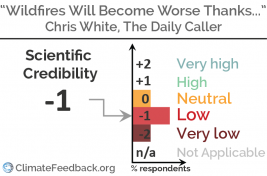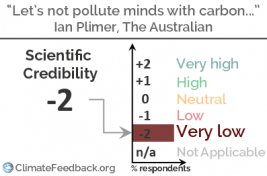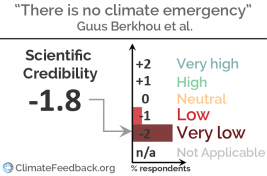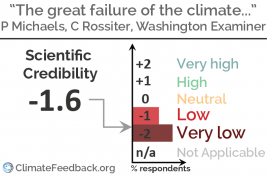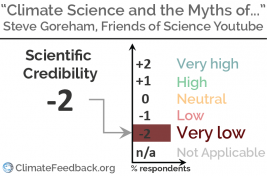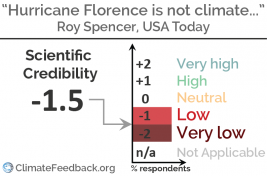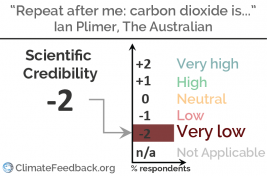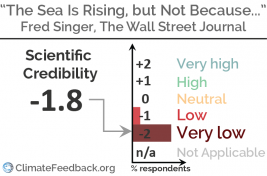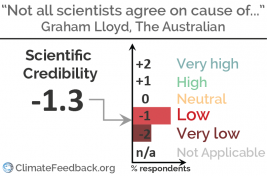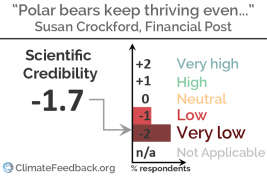.
Articles tagged as: Biased definition
Article by The Daily Caller oversimplifies drivers of wildfires and downplays role of climate change
in The Daily Caller, by Chris White
“The causes of the increase in burned area in the western US in recent decades – and the record-setting fires of 2020 – are complex, driven by a mix of a changing climate, a 100-year legacy of overzealous fire suppression in forests adapted for frequent low-level fires, more people living in highly flammable wildland urban interface areas, and at times a counterproductive role of some environmental regulations. However, this article glosses over much of this complexity, presenting a simple but misleading narrative that land management rules enacted by the Clinton administration set the stage for the destructive fires we are experiencing today.”
— 28 Sep 2020
Ian Plimer op-ed in The Australian again presents long list of false claims about climate
in The Australian, by Ian Plimer
“This article is a mixture of misdirection, misleading claims, and outright falsehoods. The author attempts to paint a picture of current climate change as simply a continuation of natural changes that have occurred in the past. But this neglects the clear evidence that climate change over the last two centuries has been shown to be largely man-made, that it is much more rapid that anything we have seen in the last two thousand years if not longer, and that it is occurring in the context of a globe with more than 7 billion human inhabitants.”
— 26 Nov 2019
Letter signed by “500 scientists” relies on inaccurate claims about climate science
in clintel.nl, by Guus Berkhout, Reynald du Berger, Terry Dunleavy, Viv Forbes, Jeffrey Fos, Morten Jodal, Rob Lemeire, Richard Lindzen, Ingemar Nordin, Jim O'Brien, Alberto Prestininzi, Benoit Rittaud, Fritz Vahrenholt, Christopher Monckton
“The scientific content is completely inaccurate, undocumented, and fails to bring proof for its claims. The ending of the Little Ice Age in 1850 has no logical link with the fact that the Earth is warming now. Most past climate variations have been slower or less intense as the present one, and if they were as fast or severe they brought about mass extinctions in the biosphere. No explanation or proof is brought on the implausibility or inaccuracy of climate models (whose accuracy or uncertainty is precisely quantified and makes their use better than just random guesses).”
— 04 Oct 2019
Washington Examiner op-ed cherry-picks data and misleads readers about climate models
in The Washington Examiner, by Patrick Michaels, Caleb Stewart Rossiter
“This article focuses only on specific lines of evidence that climate models disagree with observations. In doing so, the authors ignore research that helps to reconcile differences between models and observations. The authors do not consider alternate datasets and time periods in which models and observations agree. Models are one tool for understanding climate change; their overall credibility does not hinge on one variable, in one domain, over a specific time period, with respect to a set of imperfect observations.”
— 31 Aug 2019
Popular “Friends of Science” video promoted by Youtube presents long list of climate myths
in Friends of Science, YouTube, by Steve Goreham
“The video presents a litany of the usual climate denier talking points, none of which hold any water. It is full of outright false claims and does not even shy away from presenting a fake TIME magazine cover that supposedly warned of an ice age. “Friends of Science” is an advocacy group “largely funded by the fossil fuel industry””
— 21 Dec 2018
USA Today op-ed ignores evidence to claim climate change had no role in Hurricane Florence
in USA Today, by Roy Spencer
This op-ed in USA Today makes the claim that Hurricane Florence has no appreciable contribution from human-caused climate change.
Scientists who reviewed the article found that it ignores the evidence for trends in tropical cyclone behavior, including slower movement speed and more intense rainfall. Additionally, sea level rise raised the storm surge of the landfalling tropical cyclone above the level it would have reached a century ago. The article cherry-picks data in misleading way to claim that recent storms are no different from past tropical cyclones…
— 17 Sep 2018
The Australian publishes “deeply ill-informed” opinion on climate by Ian Plimer
in The Australian, by Ian Plimer
“This article is an amalgamation of logical fallacies, misleading talking points, and downright factually incorrect statements regarding the physics of the climate system. Every talking point in this article has been debunked many times over and it is astonishing that this was published.”
— 09 Aug 2018
Wall Street Journal commentary grossly misleads readers about science of sea level rise
in The Wall Street Journal, by Fred Singer
“The article has almost nothing to do with the modern state of sea-level science. The author tries to call into question that global warming causes sea-level rise, and does so by cherry-picking a short segment of data from 1915-1945, a time when data quality is poor and the warming signal small—a bizarre approach that could never pass scientific peer review and is apparently aimed at misleading a lay audience.”
— 18 May 2018
The Australian’s coverage of Great Barrier Reef study creates perception that scientists are divided
in The Australian, by Graham Lloyd
“The Australian chooses to present a mixed message on this story when the science is extremely clear. The title and quote from Prof. Kaempf do not represent the views of the broader scientific community.”
— 22 Apr 2018
Financial Post publishes misleading opinion that misrepresents science of polar bears’ plight
in Financial Post, by Susan Crockford
“The article is composed of misstatements. These are either based upon the author’s apparent lack of understanding of the ecological and geophysical situations, or intent to mislead readers.”
— 02 Mar 2018

